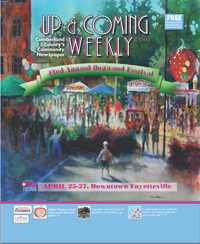 We seem to be adrift when it comes to making our community economically prosperous.
We seem to be adrift when it comes to making our community economically prosperous.
During the past decade, our taxpayer-funded industry hunter, the Fayetteville Cumberland Economic Development Corporation, hooked a couple of large employer prospects that could have made a dent in our unemployment rate. We rejected them because they smelled, literally.
I’m not saying we needed an ethanol plant that would foul the air with the stench of French fries or stale beer. And, I’m not saying we needed a chicken-rendering plant considered by some too environmentally unsound for a long-vacant industrial site. But I am saying we need to decide what we are willing to accept to make our economically strapped community whole again.
So, when the civic education minded Cumberland Community Awareness Network hosted a forum for the six candidates vying for three seats on the Cumberland County Board of Commissioners, the first question I asked as moderator was about our economic health.
My question stemmed from the concerns I had after reading Cumberland County Manager Amy Cannon’s 19-page budget letter to the Board of Commissioners. The letter is the summary of the county’s $430 million budget.
Cannon didn’t paint a good economic picture for Cumberland County. Sure, the tax rate remains at 74 cents for every $100 worth of property, of which each penny rakes in about $2.3 million. It’s an election year for two of the seven-member board, so a tax hike would be a tough choice for the incumbents.
Basically, it’s a bare-bones budget. “The increasing demand for services and rising operational expenses significantly outweigh our available revenue, which has not returned to pre-recession levels,” Cannon states in her message.
She goes on to say that while the rest of North Carolina has recovered from the recession, Cumberland County still lags. For example, the average growth for sales tax before the start of the 2008 recession was 6.68 percent. After the recession, the average growth was 2.45 percent. That, according to Cannon, is a yearly loss of $1.88 million or almost $9.5 million for the past five years.
So, I asked how they would fix our economy. The answers surprised me.
While the city, county and PWC fund the FCEDC to the tune of about $1 million a year to lure big business to Cumberland County, the candidates all gravitated around the idea of supporting small, local businesses.
Candidate Michael Boose called it “growing our own.” And candidate Wade Fowler called it “economic gardening.” And while the others didn’t have a catch name for it, they all touched on the need to do more for local businesses. But there were no details, and to be fair, three minutes to answer the question wasn’t enough time.
But most agreed, helping small businesses in our community grow will help create jobs. And jobs, however small at first, will make our community economically robust.
When you head to the polls this November to vote for one of the two most unpopular presidential candidates ever, know that local elections, especially for the Board of Commissioners, can have a significant effect on how we as a community move forward.

 How to resolve AdBlock issue?
How to resolve AdBlock issue? 









